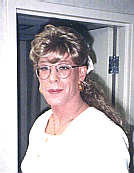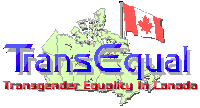



Selected Writings:
Transgender Issues

Itís A Queer Thing:
The Movement for Transgender Rights in Canada
©Peoples Voice Online
People's Voice Email
June 1998
By Chris Frazer
In 1992, transgender activist Leslie Feinberg, an American Marxist, published Transgender Liberation: A Movement Whose Time Has Come, a call for gender-queers to fight the oppressive gender ideology of capitalism.
Feinbergís manifesto coincided with an upsurge in political organizing by trans-activists in the United States, who have pushed forward the struggle to win civil rights for trans-people in states like Minnesota and many municipalities across the USA.
The movement is now coalescing in Canada, where two recent developments have focused greater public attention on the presence of transgendered persons and their issues.
In Toronto, more than 250 transgendered delegates arrived from across Canada, the USA, England, and Australia for the 12th Annual convention of the International Foundation for Gender Education (IFGE), March 23-29.
The IFGE gathering addressed a range of topics -- from human rights, to HIV, trans-prisoners, gender theory, spirituality, marriage and relationships, and "how-to" make-up sessions -- that reflect the diversity of politics and issues that concern male-to-female and female-to-male transexuals, crossdressers, gender-queers, and many others who simply do not conform to "conventional" gender identity norms.
Meeting for the first time outside the USA, the convention illustrated the extent to which the transgendered community is becoming organized and visible, and that there are real possibilities for confronting stereotypes and discrimination.
Miqqi Alicia Gilbert, also known as Michael A. Gilbert, is a philosophy professor at York University. As a "committed crossdresser," Gilbert is a part of the new wave of trans-people who are no longer prepared to remain hidden and silent.
This trend is especially evident at universities and colleges where many academics are not only "coming out," but are also researching and teaching "transgender studies." And equally as impressive are the growing numbers of young people, both on and off campus, who "are confronting their transgenderism at an earlier age," said Gilbert.
Gilbert is a member of Xpressions, an Ontario-based support group which hosted the IFGE meeting. For many years, such groups provided a much- needed network of contacts for transgendered people, many of whom remain closeted in the absence of reliable protection against discrimination.
 But things are starting to change. It may not have been surprising to
see Toronto playwright Sky Gilbert mingling with delegates. But Miqqi
Gilbert could not suppress a chuckle when telling the Peopleís Voice
that Ontario Tory Premier Mike Harris supported the Xpressions bid for
the conference with a machine-signed form letter. "Iím not sure that
he really knows what he signed," said a delighted Gilbert.
But things are starting to change. It may not have been surprising to
see Toronto playwright Sky Gilbert mingling with delegates. But Miqqi
Gilbert could not suppress a chuckle when telling the Peopleís Voice
that Ontario Tory Premier Mike Harris supported the Xpressions bid for
the conference with a machine-signed form letter. "Iím not sure that
he really knows what he signed," said a delighted Gilbert.
Far more significant was the speech of Ontario Human Rights Commissioner Keith Norton who told surprised delegates that transgendered persons are protected in Ontario under the provinceís sexual orientation provisions, but that the time had come to include specific reference to the transgendered in the provincial human rights act.
"He began doing research and discovered that we are the least protected people," said Gilbert. At present, only Quebec offers explicit human rights protection for the transgendered.
Many queer and transgendered activists argue that protections based on sexual orientation are insufficient for checking discrimination against trans-people. Groups like the International Conference on Transgendered Law and Employment Policy (ICTLEP) point out that transgendered persons have the same range of sexual orientation as non-transgendered people.
The issue is also one of physical appearance and how this reflects gender identity, which is why many trans-activists believe that human rights protections must be extended to include provisions on gender identity as well as on sexual orientation.
This is the question facing activists in British Columbia who are struggling to prevent the NDP government from sweeping human rights protection for transgendered people under the carpet.
In January 1998, the B.C. Human Rights Commission urged the adoption of eleven amendments to the provincial Human Rights Code, including one that would "prohibit discrimination on the basis of gender identity."
The amendment would provide recourse for transgendered people who presently face a largely unchecked range of discrimination and hate crimes, said Victoria-based activist Gail Owen in an interview with the Peopleís Voice.
"In this province, transgendered persons are attacked every day of the year. They are beaten up, fired from their jobs, denied medical attention, and discriminated against in the court system," said Owen, who is a male-to-female transgendered person. She is also a business agent for the Public Service Alliance of Canada (PSAC) and was formerly a provincial organizer for the NDP.
Owen served on the Transgendered Advisory Committee for the B.C. Human Rights Commission, which heard from hundreds of witnesses, including male-to-female and female-to-male transexuals, crossdressers, and drag queens and kings, during the autumn of 1997.
However, B.C. Attorney General Ujjal Dosanjh wants to shelve the amendments. Owen believes that the NDP government is afraid of a backlash from the religious right-wing and the opposition Liberals.
Last yearís recall campaign against three NDP legislators started when the religious right-wing took up the cudgel against elected officials who supported gay, lesbian, bisexual and transgendered rights.
The Liberals also oppose protection for transgendered persons. Liberal human rights critic Jeff Plant cynically hides his trans-phobia by arguing that the timing is wrong. Thatís the same kind of logic that racists used to defend segregation in the USA and apartheid in South Africa.
However, the fight is far from over, and trans-activist are not alone.
Among those supporting the amendments are the B.C. Federation of Labour, the Victoria and District Labour Council, the B.C. Teachers Federation, and, despite the legislative wingís equivocation, the provincial NDP.
Transgender activists and their allies are stepping up pressure on the B.C. government. They are urging supporters to call the Attorney General at 250-387-1866.
Many hope that the struggle will be strengthened by the recent Supreme Court decision (Vriend vs. Alberta), which ruled that sexual orientation is a prohibited ground for discrimination and must be included in Albertaís Individual Rights Protection Act.
But the decisive weapon in winning this struggle lies in unity and solidarity between the transgendered and queer communities, and the labour and democratic movements. In the final analysis, human rights protection for transgendered persons is a class question as well as one of democracy and human rights.
As long as transgendered people are unprotected, the employing class and their right-wing representatives will continue to use a climate of fear and intolerance as a weapon to discipline, intimidate, and divide working people -- in the same way they use sexism, racism, and homophobia.
Legal protections wonít make these things go away by themselves, but they can serve the working class and its allies in forging stronger unity in the struggle against exploitation and oppression.
Please feel free to repost and reprint this article, with due acknowledgement
to the author and People's Voice.

This page was last  on September 9, 1998
on September 9, 1998

According to this counter
you are person
to visit this page since
August 7, 1998
